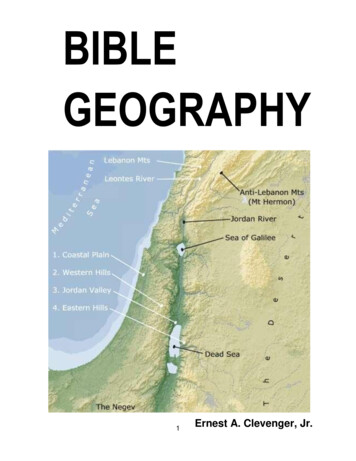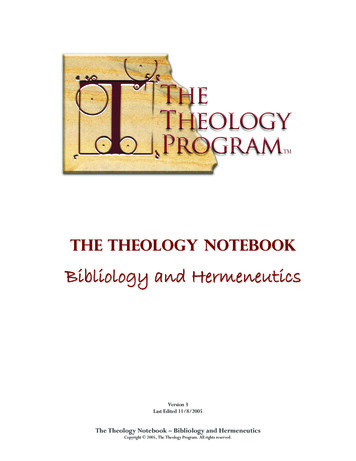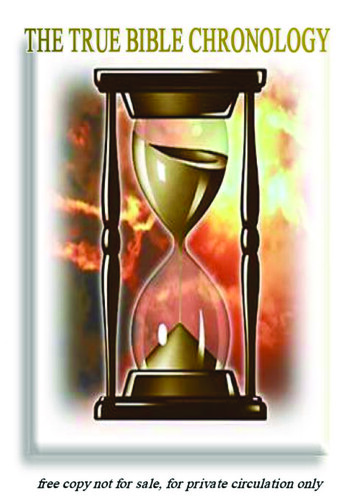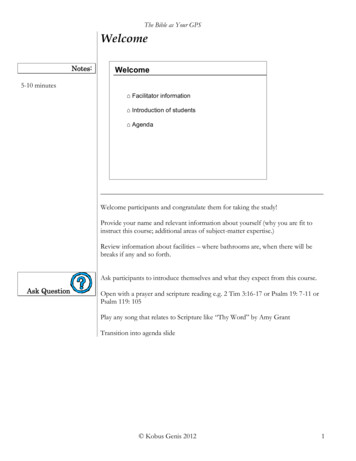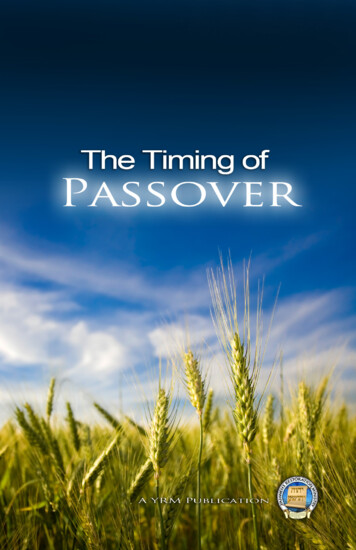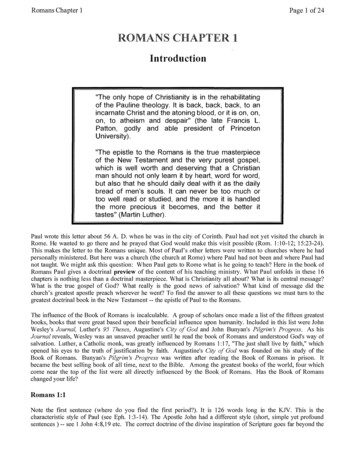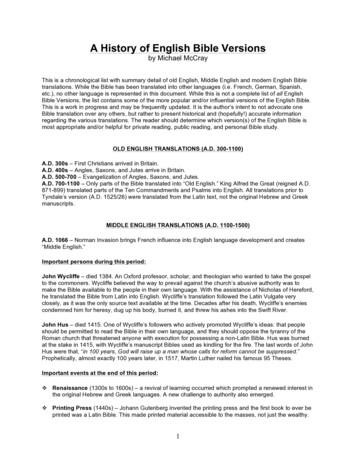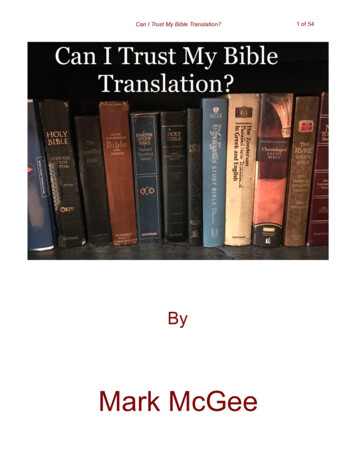
Transcription
WHY WE BELIEVE THE BIBLEWeBelieveBible.SG.07717.i04.indd 14/30/09 8:24 AM
WeBelieveBible.SG.07717.i04.indd 24/30/09 8:24 AM
WHY WE BELIEVETHE BIBLEStudy Guide Developed by Desiring GodC R O S S W AY B O O K SW H E ATON, I L L I NOI SWeBelieveBible.SG.07717.i04.indd 34/30/09 8:24 AM
Why We Believe the Bible Study GuideCopyright 2009 by Desiring God FoundationPublished by Crossway Booksa publishing ministry of Good News Publishers1300 Crescent StreetWheaton, Illinois 60187This study guide is based on and is a companion to Why We Believe the Bible (DVD)by John Piper (Crossway Books, 2009).All rights reserved. No part of this publication may be reproduced, stored in aretrieval system, or transmitted in any form by any means, electronic, mechanical,photocopy, recording, or otherwise, without the prior permission of the publisher,except as provided for by USA copyright law.Cover design: Amy BristowCover photo: iStockFirst printing 2009Printed in the United States of AmericaUnless otherwise indicated, Scripture quotations are from the ESV Bible (The HolyBible, English Standard Version ), copyright 2001 by Crossway Bibles, a publishing ministry of Good News Publishers. Used by permission. All rights reserved.Scripture quotations marked nasb are from The New American Standard Bible. Copyright The Lockman Foundation 1960, 1962, 1963, 1968, 1971, 1972, 1973,1975, 1977, 1995. Used by permission.Trade paperback ISBN: 978-1-4335-0771-7PDF ISBN: 978-1-4335-0772-4Mobipocket ISBN: 7717.i04.indd 41610159148137612511410309214/30/09 8:24 AM
CONTENTSIntroduction to This Study Guide 7Lesson 11: Introduction to Why We Believe the Bible 11Lesson 12: Why Does It Matter If the Bible Is True?(Part 1) 13Lesson 13: Why Does It Matter If the Bible Is True?(Part 2) 28Lesson 14: Which Books Make Up the Bible? 44Lesson 15: Do We Have the Very Words Written by theBiblical Authors? 65Lesson 16: What Does the Bible Claim for Itself? 81Lesson 17: How Can We Justify the Claim That the BibleIs God’s Word? (Part 1) 98Lesson 18: How Can We Justify the Claim That the BibleIs God’s Word? (Part 2) 113Lesson 19: Natural Revelation and the Reliability ofthe Bible 129Lesson 10: The Internal Testimony of the Holy Spirit 141Lesson 11: What Does It Mean That the BibleIs Inerrant? 158Lesson 12: Review and Conclusion 173Leader’s Guide 175Appendix A: Six-Session Intensive Option 181Appendix B: Leading Productive Discussions 183WeBelieveBible.SG.07717.i04.indd 54/30/09 8:24 AM
WeBelieveBible.SG.07717.i04.indd 64/30/09 8:24 AM
INTRODUCTION TO THIS STUDY GUIDEJESUS SAID SOME VERY HARD THINGS. So hard, in fact,that many who followed him turned back and wanted nothing todo with him. On one such occasion, Jesus turned to the twelve disciples and asked, “Do you want to go away as well?” John recordsSimon Peter’s answer: “Lord, to whom shall we go? You have thewords of eternal life, and we have believed, and have come toknow, that you are the Holy One of God” (John 6:67–69). SimonPeter knew that no one spoke like Jesus. Jesus spoke with authority. He spoke words of eternal life and Peter believed.The situation is similar today when we come to the Bible. Formany, the Bible is either offensive or irrelevant: a patchwork quiltof antiquated dogma, conflicting data, and unfounded myths. Itmay have value as a historical relic, or perhaps we may glean someinsight from its ethical teachings, but it is certainly not reliable asa guide to all of life. Furthermore, other religious texts such asthe Qur’an, the Bhagavad Gita, the Book of Mormon, and theBuddhist Sutras grapple for our allegiance. We are a torn peoplein need of clarity.7WeBelieveBible.SG.07717.i04.indd 74/30/09 8:24 AM
Introduction to This Study GuideThe purpose of this study guide is to help you part the philosophical fog and delight in the cast-iron reliability of the Word ofGod. Paul had similar desires for Timothy when he wrote, “AllScripture is breathed out by God and profitable for teaching,for reproof, for correction, and for training in righteousness”(2 Timothy 3:16). Our prayer is that you would feel the life-givingnature of these words and say of the Scriptures, “More to bedesired are they than gold, even much fine gold; sweeter also thanhoney and drippings from the honeycomb” (Psalm 19:10).After all, the stakes are high. Paul said all Scripture is breathedout by God. Peter said Jesus had the words of eternal life. If they areright, then to reject the Scriptures is not simply being misinformed.It is suicidal. May God be pleased to use this resource to protectthousands from stopping their ears to his voice and to cause themto heed the words of Isaiah: “Listen diligently to me, and eat whatis good, and delight yourselves in rich food. Incline your ear, andcome to me; hear, that your soul may live” (Isaiah 55:2–3).This study guide is designed to be used in a twelve-session,1guided group study that focuses on the Why We Believe the BibleDVD set.2 After an introductory lesson, each subsequent lessonexamines one 30-minute session3 from the DVD. You, the learner,are encouraged to prepare for the viewing of each session by reading and reflecting upon Scripture, by considering key quotations,and by asking yourself penetrating questions. Your preparatorywork for each lesson is marked with the heading “Before YouWatch the DVD, Study and Prepare” in Lessons 2–11.The workload is conveniently divided into five daily (andmanageable) assignments. There is also a section suggesting further study. This work is to be completed individually before thegroup convenes to view the DVD and discuss the material.8WeBelieveBible.SG.07717.i04.indd 84/30/09 8:24 AM
Introduction to This Study GuideThroughout this study guide, paragraphs printed in a shadedbox (like this one) are excerpts from a book written by JohnPiper or from the Desiring God Web site, or excerpts fromother sources. They are included to supplement the studyquestions and to summarize key or provocative points.The second section in Lessons 2–11, entitled “Further Up andFurther In,” is designed for the learner who wants to explore theconcepts and ideas introduced in the lesson in greater detail. Thissection is not required, but will deepen your understanding of thematerial. This section requires that you read online sermons orarticles from the Desiring God Web site (www.desiringGod.org)and answer relevant questions. These sermons can be found byperforming a Title Search at the Desiring God Web site.The third section in Lessons 2–11, entitled “While You Watchthe DVD, Take Notes,” is to be completed as the DVD is playing.This section includes fill-in-the-blanks and leaves space for notetaking. You are encouraged to engage with the DVD by filling inthe appropriate blanks and writing down other notes that will aidyou in the group discussion.The fourth section in each normal lesson is “After You Watchthe DVD, Discuss What You’ve Learned.” Three discussion questions are provided to guide and focus the conversation. You mayrecord, in the spaces provided, notes that will help you contributeto the conversation. Or, you may use this space to record thingsfrom the discussion that you want to remember.The fifth and final section is an application section: “After YouDiscuss, Make Application.” You will be challenged to record a“take-away point” and to engage in a certain activity that is a fitting response to the content presented in the lesson.9WeBelieveBible.SG.07717.i04.indd 94/30/09 8:24 AM
Introduction to This Study GuideGroup leaders will want to find the Leader’s Guide, includedat the end of this study guide, immediately.Life transformation will only occur by the grace of God.Therefore, we highly encourage you to seek the Lord in prayerthroughout the learning process. Pray that God would open youreyes to see wonderful things in his Word. Pray that he would grantyou the insight and concentration you need in order to get the mostfrom this resource. Pray that God would cause you not merely tounderstand the truth, but also to rejoice in it. And pray that thediscussion in your group would be mutually encouraging and edifying. We’ve included objectives at the beginning of each lesson.These objectives won’t be realized without the gracious work ofGod through prayer.NOTES1. While this study guide is ideally suited for a twelve-session study, it ispossible to complete it in six sessions. For instructions on how to usethis study guide for a six-session group study, turn to Appendix A:Six-Session Intensive Option.2. Although this resource is designed to be used in a group setting, it canalso be used by the independent learner. Such a learner would have todecide how to use this resource in the most beneficial way. We wouldsuggest doing everything but the group discussion, if possible.3. Thirty minutes is only an approximation. Some sessions are longer;others are shorter.10WeBelieveBible.SG.07717.i04.indd 104/30/09 8:24 AM
LESSON 1INTRODUCTION TO WHY WE BELIEVE THE BIBLELESSON OBJECTIVESIt is our prayer that after you have finished this lesson . . .› You will have a better sense of how you and others inyour group approach the Bible.› Your curiosity will be roused, and questions will cometo mind.› You will be eager to better cherish and defend the reliability of the Scriptures.ABOUT YOURSELF1) What is your name?2) Tell the group something about yourself that they probablydon’t already know.3) What are you hoping to learn from this study?11WeBelieveBible.SG.07717.i04.indd 114/30/09 8:24 AM
WHY WE BELIEVE THE BIBLEA PREVIEW OF WHY WE BELIEVE THE BIBLE1) Think about your own history in relation to the Bible.How have you changed in the way you view theScriptures? What were some influences that broughtyou to where you are today?2) List some common objections to the believability of theScriptures. Circle one that you feel is most widespreadtoday. How would you respond to this objection?12WeBelieveBible.SG.07717.i04.indd 124/30/09 8:25 AM
LESSON 2WHY DOES IT MATTER IF THE BIBLE IS TRUE?(PART 1)A Companion Study to theWhyWe Believe the Bible DVD,Session 1LESSON OBJECTIVESIt is our prayer that after you have finished this lesson . . .› You will feel the importance of believing that the Bibleis reliable.› You will better grasp the life-giving purpose of the Wordof God.› You will be more aware of the opposition that existsagainst the trustworthiness of Scripture.BEFORE YOU WATCH THE DVD, STUDY AND PREPAREDAY 1: WHAT’S AT STAKE?Before examining the case for believing the Scriptures, it is important to ask why the question matters in the first place.13WeBelieveBible.SG.07717.i04.indd 134/30/09 8:25 AM
WHY WE BELIEVE THE BIBLE*QUESTION 1: Suppose someone were to ask you, “Whydoes it matter whether the Bible is true?” How would you answerhim? Out of the possible responses you could give, try to identifythe one you feel is the most compelling. Provide any scripturalsupport you can think of.1Now consider the importance of the question through Peter’seyes as he addresses the difficulty of some of Paul’s sayings.2 PETER 3:15–1615 Andcount the patience of our Lord as salvation, just as ourbeloved brother Paul also wrote to you according to the wisdomgiven him, 16 as he does in all his letters when he speaks in themof these matters. There are some things in them that are hard tounderstand, which the ignorant and unstable twist to their owndestruction, as they do the other Scriptures.QUESTION 2: According to Peter, what is the danger ofneglecting the true meaning of Scripture? Underline the phrasethat explicitly identifies the consequence. What type of destructiondoes Peter have in mind? See 2 Peter 3:7 for further help.14WeBelieveBible.SG.07717.i04.indd 144/30/09 8:25 AM
Lesson 2DAY 2: SWEETER THAN HONEYExamine the portrayal of the Scriptures in the following passage.PSALM 19:7–107 The law of the Lord is perfect, reviving the soul; the testimonyof the Lord is sure, making wise the simple; 8 the precepts ofthe Lord are right, rejoicing the heart; the commandment ofthe Lord is pure, enlightening the eyes; 9 the fear of the Lordis clean, enduring forever; the rules of the Lord are true, andrighteous altogether. 10 More to be desired are they than gold,even much fine gold; sweeter also than honey and drippings ofthe honeycomb.*QUESTION 3: David uses words such as “law,” “testimony,” and “precepts” to refer to the words of the Lord.Underline each word or phrase that explains what the Scripturesare like. What does their united testimony say about the Bible?How should that affect the way we feel about the Bible today?Reflect on the testimony of a man named “Little Bilney” whowas an English Reformer born in 1495. Notice the connection inhis story between salvation and treasuring the words of the Bible.I chanced upon this sentence of St. Paul (O most sweetand comfortable sentence to my soul!) in 1 Timothy 1: “It isa true saying, and worthy of all men to be embraced, thatChrist Jesus came into the world to save sinners; of whom15WeBelieveBible.SG.07717.i04.indd 154/30/09 8:25 AM
WHY WE BELIEVE THE BIBLEI am the chief and principal.” This one sentence, throughGod’s instruction and inward working, which I did not thenperceive, did so exhilarate my heart, being before woundedwith the guilt of my sins, and being almost in despair, that. . . immediately I . . . felt a marvelous comfort and quietness, in so much that “my bruised bones leaped for joy.”After this, the Scriptures began to be more pleasant to methan the honey or the honeycomb.2QUESTION 4: According to Little Bilney’s account, howdoes a person come to experience the words of the Bible as “morepleasant . . . than the honey or the honeycomb”? What must takeplace before this can be truly felt?DAY 3: HIS DELIGHT IS IN THE LAW OFTHE LORDPsalm 1 offers a vivid picture of what the righteous man looks like.Read this passage and then answer the following question.PSALM 11 Blessedis the man who walks not in the counsel of the wicked,nor stands in the way of sinners, nor sits in the seat of scoffers;2 but his delight is in the law of the Lord, and on his law hemeditates day and night. 3 He is like a tree planted by streamsof water that yields its fruit in its season, and its leaf does notwither. In all that he does, he prospers. 4 The wicked are notso, but are like chaff that the wind drives away. 5 Therefore thewicked will not stand in the judgment, nor sinners in the con16WeBelieveBible.SG.07717.i04.indd 164/30/09 8:25 AM
Lesson 2gregation of the righteous; 6 for the Lord knows the way of therighteous, but the way of the wicked will perish.QUESTION 5: Draw a line down the center of your answerspace. In the left column, list the descriptions of the wicked. Whatdo they do? What are they like? What is their destiny? Now list thedescriptions of the righteous man in the right column and answerthe same questions. What is the distinguishing mark of the righteous man? To whose words does he listen? What type of listeningdoes the Psalmist have in mind?What exactly is it about the Bible that protects a person fromdestruction and provides him with streams that nourish his roots?It is possible to answer this question wrongly. Observe the wayJesus rebukes the Pharisees in the following passage.JOHN 5:39–4039 Yousearch the Scriptures because you think that in them youhave eternal life; and it is they that bear witness about me, 40 yetyou refuse to come to me that you may have life.*QUESTION 6: What was wrong with the way the Phariseesapproached the Bible? How does Jesus correct them? Accordingto this, what exactly is the relationship between the Scriptures andeternal life?17WeBelieveBible.SG.07717.i04.indd 174/30/09 8:25 AM
WHY WE BELIEVE THE BIBLEThe Lord opens the eyes of the heart to see the glory ofChrist in the Word. God has chosen in this age to revealhimself to the world mainly through the incarnate Word, Jesus Christ, by means of the written Word, the Bible.3DAY 4: A LONG LINE OF LOVERSOne of the gifts God has given to his church is a heritage ofcorporate statements that detail what it means for the Bible tobe reliable. One such statement is the Chicago Statement onBiblical Inerrancy, written in 1978. Below is an excerpt fromthis statement.2. Holy Scripture, being God’s own Word, written by menprepared and superintended by His Spirit, is of infallible divine authority in all matters upon which it touches: It is to bebelieved, as God’s instruction, in all that it affirms; obeyed,as God’s command, in all that it requires; embraced, asGod’s pledge, in all that it promises. . . . 4. Being whollyand verbally God-given, Scripture is without error or fault inall its teaching, no less in what it states about God’s actsin creation, about the events of world history, and about itsown literary origins under God, than in its witness to God’ssaving grace in individual lives.QUESTION 7: In the space below, list several key words theChicago Statement provides to describe what it means for the Bibleto be trustworthy. In what areas is the Bible without error?18WeBelieveBible.SG.07717.i04.indd 184/30/09 8:25 AM
Lesson 2Now examine the Chicago Statement in light of the followingpassage.2 TIMOTHY 3:1616All Scripture is breathed out by God and profitable forteaching, for reproof, for correction, and for training in righteousness.*QUESTION 8: What is the significance of the phrase“breathed out by God”? Why does it matter that this qualityapplies to “all Scripture”? What does this imply for those whoreject all or part of the Bible?DAY 5: THE BIBLE UNDER FIRENot everyone agrees that all of the Bible can be trusted. Interactwith the following portion of a letter submitted to the MinneapolisStar-Tribune by the Minnesota Atheists (published October 17,1992).One of the few worthwhile statements in the Bible is, “Youshall know the truth and the truth shall make you free.” . . .Knowledge of the Bible is hindered by the informal censorship imposed by religious leaders who would rather theirfollowers didn’t know what’s in it—the innumerable contradictions, historical errors, plagiarism, absurdities, meaningless prophecies, myths presented as historical fact, and19WeBelieveBible.SG.07717.i04.indd 194/30/09 8:25 AM
WHY WE BELIEVE THE BIBLEcountless instances of divinely ordered or approved atroci-ties. . . . It is true that the Bible has some worthwhile material, including entertaining stories, inspirational sentimentsand astute observations about human behavior. However,these worthwhile parts could probably be contained in apamphlet.5*QUESTION 9: Summarize the argument of these authors inone sentence. How would you respond to someone who held theseconvictions about the Bible?The letter quotes Jesus’ words in John 8:32, “And you willknow the truth and the truth will set you free.” Study this verse inits original context to discern what Jesus meant when he said this.JOHN 8:31–3831 So Jesus said to the Jews who had believed in him, “If you abidein my word, you are truly my disciples, 32 and you will know thetruth, and the truth will set you free.” 33 They answered him,“We are offspring of Abraham and have never been enslavedto anyone. How is it that you say, ëYou will become free’?”34 Jesus answered them, “Truly, truly, I say to you, everyone whocommits sin is a slave to sin. 35 The slave does not remain in thehouse forever; the son remains forever. 36 So if the Son sets youfree, you will be free indeed. 37 I know that you are offspringof Abraham; yet you seek to kill me because my word finds noplace in you. 38 I speak of what I have seen with my Father, andyou do what you have heard from your father.”20WeBelieveBible.SG.07717.i04.indd 204/30/09 8:25 AM
Lesson 2QUESTION 10: What is the truth Jesus is referring to in John8:32? How does a person know this truth? What is the slaveryfrom which this truth will set a person free? Why did the Jewswant to kill Jesus?FURTHER UP AND FURTHER INNote: The “Further Up and Further In” section is for those whowant to study more. It is a section for further reference and goingdeeper. The phrase “further up and further in” is borrowed fromC. S. Lewis.As noted in the Introduction, each lesson in this study guideprovides the opportunity for you to do further study. In this section, you will have the opportunity to read a sermon or an articleand answer some questions about what you read.Read or listen to “Contend for the Faith,” an online sermonat the Desiring God Web site.QUESTION 11: According to John Piper, which verse in Judecontains the main point of the book? Write out this verse in thespace below.21WeBelieveBible.SG.07717.i04.indd 214/30/09 8:25 AM
WHY WE BELIEVE THE BIBLEQUESTION 12: Why do such books as the Qur’an and theBook of Mormon contradict Jude’s teaching that the faith has been“once for all delivered to the saints” (Jude 3)?John Piper refers to Jude 22–23. Read this passage and thenanswer the following question.JUDE 22–2322 And have mercy on those who doubt; 23 save others by snatch-ing them out of the fire; to others show mercy with fear, hatingeven the garment stained by the flesh.QUESTION 13: According to John Piper, what two thingsare involved in contending for the faith from these two verses?How does this affect the way we think about contending for thereliability of the Scriptures?Read Section 1 of the Bethlehem Baptist Church (BBC)Elder Affirmation of Faith entitled “Scripture, the Word of GodWritten.”622WeBelieveBible.SG.07717.i04.indd 224/30/09 8:25 AM
Lesson 2QUESTION 14: List the factors that can inhibit a person’sunderstanding of biblical texts. Have any of these been true in yourown life? Explain.Study the following passage.1 CORINTHIANS 2:12–1412Now we have received not the spirit of the world, but theSpirit who is from God, that we might understand the thingsfreely given us by God. 13 And we impart this in words nottaught by human wisdom but taught by the Spirit, interpretingspiritual truths to those who are spiritual. 14 The natural persondoes not accept the things of the Spirit of God, for they are follyto him, and he is not able to understand them because they arespiritually discerned.QUESTION 15: According to this passage, what is the ultimate reason behind a person’s refusal to accept the authority andtrustworthiness of the Bible? How should we respond in light ofthis? Be specific.23WeBelieveBible.SG.07717.i04.indd 234/30/09 8:25 AM
WHY WE BELIEVE THE BIBLEWHILE YOU WATCH THE DVD, TAKE NOTESWhat is the first reason John Piper gives for why he is takingup the topic of the Bible’s reliability?According to John Piper, what was the greatest thing to comeout of the 1974 Lausanne Conference?If two people are in an argument and absolute truth is notfunctioning as an arbiter between them, what is the only thing leftto appeal to?What two centuries does John Piper say we ought to know?24WeBelieveBible.SG.07717.i04.indd 244/30/09 8:25 AM
Lesson 2“It would be truer to say that the is forMuslims what is for Christians.”AFTER YOU WATCH THE DVD, DISCUSS WHATYOU’VE LEARNED1) Why is it necessary to anchor our understanding ofthe Bible in the observable meaning of its words ratherthan in subjective impressions that come from outsidethe Bible?2) John Piper quoted Michael Novak, who said that thosewho reject absolute truth “prepare the jails of thetwenty-first century. They do the work of tyrants.” Doyou agree? Why is it important to defend the existenceof absolute truth?3) Discuss the difference between the Qur’an and theBible as it was presented in this lesson. What are someimplications of the fact that the Bible is 7717.i04.indd 254/30/09 8:25 AM
WHY WE BELIEVE THE BIBLEAFTER YOU DISCUSS, MAKE APPLICATION1) What was the most meaningful part of this lesson foryou? Was there a sentence, a concept, or an idea thatreally struck you? Why? Record your thoughts in thespace below.2) Pray through Psalm 19:7–11 this week. Thank God forthe characteristics of his Word that David describes andask him to help you feel this way about the Bible moreand more. Record your reflections below.NOTES1. Questions marked with an asterisk (*) are questions that we deem tobe particularly significant. If your group is completing this study using the six-session intensive option, we recommend that you completethese questions first and then, if time permits, complete the remaining questions. For more information, see Appendix A—Six-SessionIntensive Option.2. Quoted by John Piper in Desiring God (Sisters, OR: Multnomah,2003), 146.3. John Piper, When I Don’t Desire God (Wheaton, IL: Crossway, 2004),96.4. Excerpt taken from an online resource at the Desiring God Website entitled, “Why We Believe the Bible, Part 1.” Throughout this26WeBelieveBible.SG.07717.i04.indd 264/30/09 8:25 AM
Lesson 2study guide, articles and sermons at the Desiring God Web site(www.desiringGod.org) may be found by performing a Title Searchon the home page.5. John Piper, “Why We Believe the Bible, Part 1,” an online resource atthe Desiring God Web site.6. This document is accessible at eBelieveBible.SG.07717.i04.indd 274/30/09 8:25 AM
LESSON 3WHY DOES IT MATTER IF THE BIBLE IS TRUE? (PART 2)A Companion Study to theWhyWe Believe the Bible DVD,Session 2LESSON OBJECTIVESIt is our prayer that after you have finished this lesson . . .› You will have an even deeper sense of the importance ofbelieving that the Bible is reliable.› You will yearn to embrace a life of sacrificial servicebecause of the hope of the resurrection.› You will be better equipped to handle apparent contradictions in Scripture.BEFORE YOU WATCH THE DVD, STUDY AND PREPAREDAY 1: THE GODS OF THE PEOPLES AREWORTHLESS IDOLSIn the last lesson, you examined some reasons for why it matterswhether the Bible is true. In this lesson you will explore further28WeBelieveBible.SG.07717.i04.indd 284/30/09 8:25 AM
Lesson 3reasons, one of which is the fact that the Scriptures make someastounding claims. If they are true, then the Bible alone has themessage of eternal life. To see this, study Psalm 96:5 together withPsalm 115:4–8.PSALM 96:55For all the gods of the peoples are worthless idols, but theLord made the heavens.PSALM 115:4–84Their idols are silver and gold, the work of human hands.They have mouths, but do not speak; eyes, but do not see.6 They have ears, but do not hear; noses, but do not smell.7 They have hands, but do not feel; feet, but do not walk; andthey do not make a sound in their throat. 8 Those who makethem become like them; so do all who trust in them.5QUESTION 1: What is the fundamental difference betweenthe Lord and the gods of the peoples? Why does the Psalmist referto other gods as “worthless idols”? What is the danger of trustingin such idols?29WeBelieveBible.SG.07717.i04.indd 294/30/09 8:25 AM
WHY WE BELIEVE THE BIBLENow consider the universal claim of the following passage.ISAIAH 45:22–2322 Turnto me and be saved, all the ends of the earth! For I amGod, and there is no other. 23 By myself I have sworn; frommy mouth has gone out in righteousness a word that shall notreturn: “To me every knee shall bow, every tongue shall swearallegiance.”*QUESTION 2: Meditate on the phrase, “There is no other.”What are some implications of the fact that the God who hasrevealed himself in the Bible is the one true God? From whom doesGod deserve worship?DAY 2: JESUS IS THE ONLY WAY TOTHE FATHERExamine John 8:42; John 14:6–7; Acts 4:12; and 1 John 5:12 tosee what it looks like to worship the one true God.JOHN 8:4242 Jesussaid to them, “If God were your Father, you would loveme, for I came from God and I am here. I came not of my ownaccord, but he sent me.”30WeBelieveBible.SG.07717.i04.indd 304/30/09 8:25 AM
Lesson 3JOHN 14:6–76 Jesus said to him, “I am the way, and the truth, and the life. Noone comes to the Father except through me. 7 If you had knownme, you would have known my Father also. From now on youdo know him and have seen him.”ACTS 4:1212 And there is salvation in no one else, for there is no othername under heaven given among men by which we must besaved.”1 JOHN 5:1212 Whoever has the Son has life; whoever does not have the Sonof God does not have life.*QUESTION 3: According to these texts, what is the onlyway a person can truly worship God and have eternal life? If theBible is true, what does this say about other religions that rejectJesus, even if they claim to worship God?. . . Jesus is so fully God-reflecting and God-exalting thatdenying him means denying God. Jesus knows that his adversaries “do not have the love of God within [them]” because they do not receive him. “The one who rejects merejects him who sent me” (Luke 10:16). If they loved God,31WeBelieveBible.SG.07717.i04.indd 314/30/09 8:25 AM
WHY WE BELIEVE THE BIBLEthey would love him. He makes God known more clearlyand more fully than any other revelation. Therefore, it cannot be that one has love for God but rejects Jesus.1Yesterday you examined Isaiah 45:22–23. Refer back to thistext after you read the following passage.PHILIPPIANS 2:8–118 And being found in human form, he humbled himself bybecoming obedient to the point of death, even death on a cross.9 Therefore God has highly exalted him and bestowed on himthe name that is above every name, 10 so that at the name ofJesus every knee should bow, in heaven and on earth and underthe earth, 11 and every tongue confess that Jesus Christ is Lord,to the glory of God the Father.QUESTION 4: Underline the phrase from this passage thatis a reference to Isaiah 45:23. In Isaiah 45:23, who is speaking?To whom does the apostle Paul apply this statement in Philippians2:8–11? How does this affect our understanding of Jesus and theseriousness of rejecting h
1. this study guide is ideally suited for a twelve-session study, it is While possible to complete it in six sessions. For instructions on how to use . this study guide for a six-session group study, turn to Appendix A: Six-Session Intensive Option. 2. Although this r


